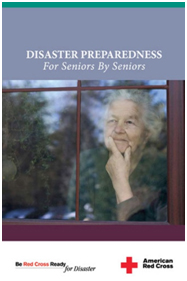
 Emergency planning for senior citizens may be different than that for younger families. In addition to the typical emergency supply kit, senior citizens may also need specialized items, such as extra wheelchair batteries, oxygen, catheters, medication, and food for service animals. There may also be other needs for senior citizens to consider during a disaster, such as mobility concerns. To address this, seniors should consider creating a network of neighbors, friends, family and co-workers to aid them during in an emergency. For more reading, see For Seniors By Seniors.
Emergency planning for senior citizens may be different than that for younger families. In addition to the typical emergency supply kit, senior citizens may also need specialized items, such as extra wheelchair batteries, oxygen, catheters, medication, and food for service animals. There may also be other needs for senior citizens to consider during a disaster, such as mobility concerns. To address this, seniors should consider creating a network of neighbors, friends, family and co-workers to aid them during in an emergency. For more reading, see For Seniors By Seniors.
Emergency Preparedness Checklist for Seniors:
- Assemble a disaster supplies kit.
- Arrange for someone to check on you regularly.
- Plan and practice the best escape routes from your home.
- Plan for transportation if you need to evacuate to a Red Cross shelter.
- Find the safe places in your home for each type of emergency.
- Have a plan to signal the need for help.
- Post emergency phone numbers near the phone.
- If you have home healthcare service, plan ahead with your agency for emergency procedures.
- Teach those who may need to assist you in an emergency how to operate necessary equipment; be sure they will be able to reach you.
- For your safety and comfort, have at least three days’ worth of emergency supplies (both medical and general) packed and ready in an easy-to-carry container, such as a backpack or duffel bag. Make sure your bag has an identification tag and label any equipment, such as wheelchairs, canes or walkers that you need.
Be prepared to go to a shelter if your area is without electrical power; if there is a chemical emergency affecting your area; if flood water is rising; if your home has been severely damaged; or if police or other local officials tell you to evacuate.
 Emergency Supply Checklist for Seniors:
Emergency Supply Checklist for Seniors:
- First-aid kit
- Prescription medicines, list of medications and dosages, list of allergies
- Extra eyeglasses and hearing-aid batteries
- Extra wheelchair batteries and oxygen
- List of the style and serial numbers of medical devices, such as pacemakers
- Medical insurance and Medicare cards
- List of doctors, relatives or friends to notify if you are hurt
- Battery-powered radio and flashlight with extra batteries for each
- Change of clothing, rain gear, and sturdy shoes
- Blanket or sleeping bag
- Extra set of keys
- Cash, credit cards, change for a pay phone
- Personal hygiene supplies
- Phone numbers of local and non-local relatives or friends
- Insurance agent’s name and phone number
For more information on emergency planning for seniors:




